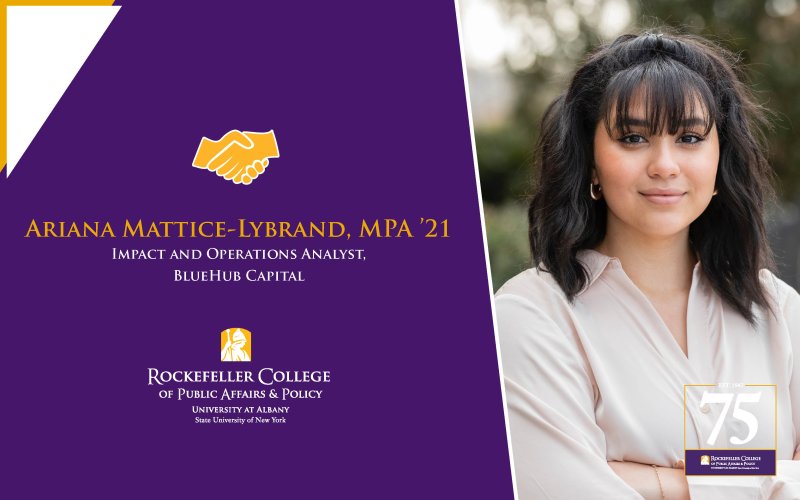Rock Your Career: Ariana Mattice-Lybrand, MPA ’21

What was one of the most meaningful experiences you had during your time in the MPA program?
The most meaningful experience of the MPA program has been working closely with and learning from people who have a similar interest and passion for public work.
Where did you complete your internship requirement and what knowledge, skills, and abilities did you develop as a result of this experience?
I was fortunate to have been fully employed when I started the MPA program. I was working for a member of the NYS Assembly as a District Office Manager. I think that role served as a really good foundation for understanding not only the issues facing our community, and NYS at large, but also an introduction into politics and how government seeks to remedy those issues. And although our office and the broader legislature was not always completely successful in meeting the needs of all groups and people, I was able to partake in a lot of valuable collaborative work with different members of the Legislature and was exposed to the different life stories of people in our district, which has really informed the way I view the world.
What specific skills or experiences through the program have prepared you for your transition to post-graduate employment?
The MPA program is incredibly multifaceted. It seeks to provide an understanding in a wide array of disciplines from management and decision-making to finance, economics, and public policy, all of which are critical areas of understanding for working in the public sector. I think in all of that, the most critical skill I learned was how each discipline informs the next and that they are not mutually exclusive of one another, but rather work together to explain or understand the nuances of everyday society. That level of thinking has really informed the way I approach my work. This program really has helped me become a better critical thinker.
Where are you currently employed and what is the focus of your position?
I currently work as an Impact and Operations Analyst with a nonprofit organization called BlueHub Capital. BlueHub is a Community Development Financial Institution (CDFI) that is focused on building healthy communities where low-income people live and work. We use innovative financial tools and deploy capital to support projects that make communities more vibrant places to live. As an Impact and Operations Analyst, my responsibility is split between two functions of the organization. The first function is deeply rooted in social impact analysis. In this capacity, I evaluate the social impact data collected and associated with commercial, charter school, and affordable housing lending. I also maintain the organization’s database of social impact rating scores for BlueHub’s social impact rating project, which is our attempt to quantify how potential loans are mission-aligned and capture the potential social impact associated with the project. The second function I am a part of is rooted in internal operations. In this capacity, I help collect and analyze internal organizational data to support various HR projects and operational improvements related to talent development, staffing, and implementation of (in consultation with CAO) practices that promote a culture of inclusive excellence (DEI). I also work with the Chief Administration Officer (CAO) to help identify organizational systems and process improvements that would improve BlueHub’s efficiency and ability to achieve its mission.
What advice do you have for students who are considering employment in the public sector and pursuing an MPA degree?
For students interested in pursuing an MPA degree, do not be afraid to ask questions! I learned the most when I reached out to professors or other peers to clarify any confusion I had with the material. I’ve realized that translates really well to the professional world too. In interviews I asked a ton of questions and felt that as much as they were making sure I was a good fit for the role, I wanted to make sure that the role and company were a good fit for me. I learned a lot by doing that and when I was rejected from the first few positions I interviewed for, I felt better about the opportunity passing because I too knew it was not a good fit. Asking questions to capture the nuances of what it is your trying to understand helps your ability to form meaningful thoughts and opinions.


